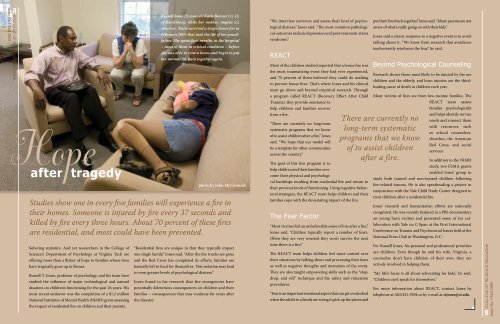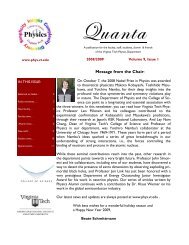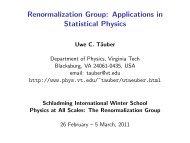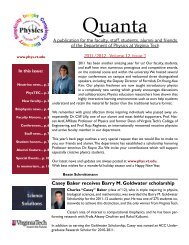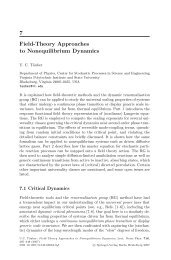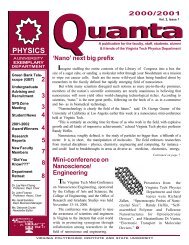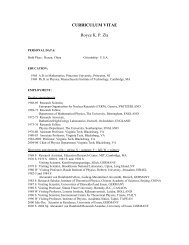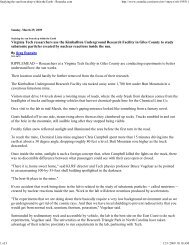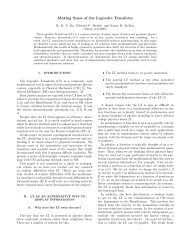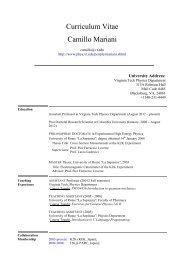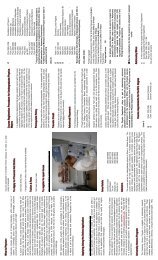College of Science Magazine, Fall 2005 - Physics - Virginia Tech
College of Science Magazine, Fall 2005 - Physics - Virginia Tech
College of Science Magazine, Fall 2005 - Physics - Virginia Tech
Create successful ePaper yourself
Turn your PDF publications into a flip-book with our unique Google optimized e-Paper software.
<strong>College</strong> <strong>of</strong> <strong>Science</strong> <strong>Magazine</strong><br />
Issue No.1 <strong>Fall</strong> <strong>2005</strong><br />
Hope<br />
after tragedy<br />
Sobering statistics. And yet researchers in the <strong>College</strong> <strong>of</strong><br />
<strong>Science</strong>’s Department <strong>of</strong> Psychology at <strong>Virginia</strong> <strong>Tech</strong> are<br />
<strong>of</strong>fering more than a flicker <strong>of</strong> hope to families whose lives<br />
have tragically gone up in flames.<br />
Russell T. Jones, pr<strong>of</strong>essor <strong>of</strong> psychology, and his team have<br />
studied the influence <strong>of</strong> major technological and natural<br />
disasters on children’s functioning for the past 26 years. His<br />
most recent endeavor was the completion <strong>of</strong> a $1.2 million<br />
National Institutes <strong>of</strong> Mental Health (NIMH) grant assessing<br />
the impact <strong>of</strong> residential fire on children and their parents.<br />
“Residential fires are unique in that they typically impact<br />
one single family,” Jones said. “After the fire trucks are gone<br />
and the Red Cross has completed its efforts, families are<br />
basically left to fend for themselves. This isolation may lead<br />
to even greater levels <strong>of</strong> psychological distress.”<br />
Jones found in his research that fire emergencies have<br />
potentially deleterious consequences on children and their<br />
families – consequences that may continue for years after<br />
the disaster.<br />
Russell Jones (l) counsels Katie Bowyer (r), 12,<br />
<strong>of</strong> Blacksburg, while her mother, Angela (c),<br />
observes. Katie survived a tragic house fire in<br />
February <strong>2005</strong> that took the life <strong>of</strong> her grandfather.<br />
She spent four months in the hospital<br />
– most <strong>of</strong> them in critical condition – before<br />
she was able to return home and begin to put<br />
her normal life back together again.<br />
photo by John McCormick<br />
Studies show one in every five families will experience a fire in<br />
their homes. Someone is injured by fire every 37 seconds and<br />
killed by fire every three hours. About 70 percent <strong>of</strong> these fires<br />
are residential, and most could have been prevented.<br />
“We interview survivors and assess their level <strong>of</strong> psychological<br />
distress,” Jones said. “The most common pathological<br />
outcomes include depression and post-traumatic stress<br />
syndrome.”<br />
REACT<br />
Most <strong>of</strong> the children studied reported that a house fire was<br />
the most traumatizing event they had ever experienced,<br />
and 75 percent <strong>of</strong> them believed they could do nothing<br />
to prevent house fires. That’s where Jones and his clinical<br />
team go above and beyond empirical research. Through<br />
a program called REACT (Recovery Effort After Child<br />
Trauma), they provide assistance to<br />
help children and families recover<br />
from a fire.<br />
“There are currently no long-term<br />
systematic programs that we know<br />
<strong>of</strong> to assist children after a fire,” Jones<br />
said. “We hope that our model will<br />
be a template for other communities<br />
across the country.”<br />
The goal <strong>of</strong> this free program is to<br />
help children and their families overcome<br />
their physical and psychological<br />
hardships resulting from residential fire and return to<br />
their previous levels <strong>of</strong> functioning. Using cognitive behavioral<br />
strategies, the REACT team helps children and their<br />
families cope with the devastating impact <strong>of</strong> the fire.<br />
The Fear Factor<br />
“Most victims feel an unbelievable sense <strong>of</strong> loss after a fire,”<br />
Jones said. “Children typically report a number <strong>of</strong> fears.<br />
Often they are very worried they won’t survive the next<br />
time there is a fire.”<br />
The REACT team helps children feel more control over<br />
their situations by talking about and processing their fears<br />
as well as negative thoughts and memories <strong>of</strong> the event.<br />
They are also taught empowering skills such as the “stop,<br />
drop, and roll” technique and fire safety and relaxation<br />
procedures.<br />
“Fear is an important emotional aspect that can get overlooked<br />
when the adults in a family are trying to pick up the pieces and<br />
put their lives back together,” Jones said. “Many parents are not<br />
aware <strong>of</strong> what’s really going on with their kids.”<br />
Jones said a classic response to a negative event is to avoid<br />
talking about it. “We know from research that avoidance<br />
inadvertently reinforces the fear,” he said.<br />
Beyond Psychological Counseling<br />
Research shows those most likely to be injured by fire are<br />
children and the elderly, and burn injuries are the thirdleading<br />
cause <strong>of</strong> death in children each year.<br />
Many victims <strong>of</strong> fires are from low-income families. The<br />
There are currently no<br />
long-term systematic<br />
programs that we know<br />
<strong>of</strong> to assist children<br />
after a fire.<br />
REACT team assists<br />
families psychologically<br />
and helps identify service<br />
needs and connect them<br />
with resources, such<br />
as school counselors,<br />
churches, the American<br />
Red Cross, and social<br />
services.<br />
In addition to the NIMH<br />
study, two FEMA grants<br />
enabled Jones’ group to<br />
study both injured and non-injured children following<br />
fire-related trauma. He is also spearheading a project in<br />
conjunction with the Yale Child Study Center designed to<br />
treat children after a residential fire.<br />
Jones’ research and humanitarian efforts are nationally<br />
recognized. He was recently featured in a PBS documentary<br />
on young burn victims and presented some <strong>of</strong> his collaboration<br />
with Yale on C-Span at the First International<br />
Conference on Trauma and Psychosocial Issues held at the<br />
National Press Club in Washington, D.C.<br />
For Russell Jones, his personal and pr<strong>of</strong>essional priorities<br />
are children. Even though he and his wife, <strong>Virginia</strong>, a<br />
counselor, don’t have children <strong>of</strong> their own, they are<br />
actively involved in helping them.<br />
“My life’s focus is all about advocating for kids,” he said.<br />
“Children can’t speak for themselves.”<br />
For more information about REACT, contact Jones by<br />
telephone at 540/231-5934 or by e-mail at rtjones@vt.edu.<br />
<strong>College</strong> <strong>of</strong> <strong>Science</strong> <strong>Magazine</strong><br />
Issue No.1 <strong>Fall</strong> <strong>2005</strong>


